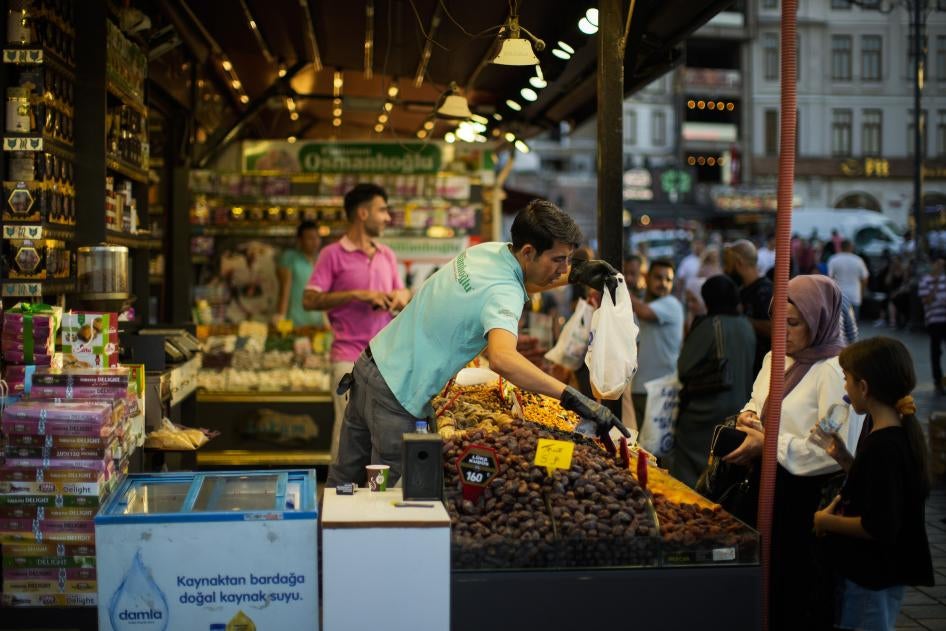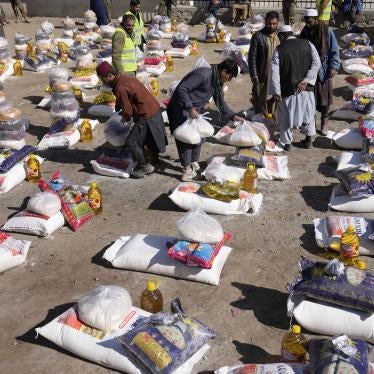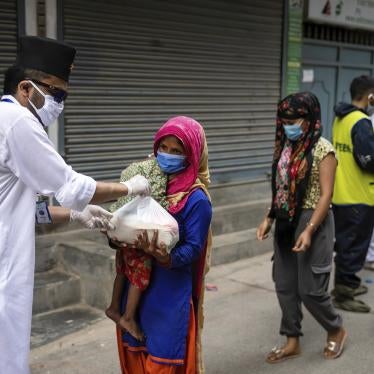This essay is part of a series highlighting global human rights trends in 2022. Read more here.
A global cost-of-living crisis is undermining human rights and endangering lives. As some companies rake in record profits, price inflation for staple foods, energy, and other goods and services essential to rights is fueling hunger and the need for charity or public assistance.
How bad this crisis gets for low- and middle-income households, however, will largely depend on whether policymakers learn what another ongoing crisis has taught: universal social protection works.
The Covid-19 pandemic was a major setback in the global fight to end poverty and reduce economic inequality, as the world’s poorest people bore much of the pandemic’s costs. But the pandemic’s economic harm was generally most acute in countries without strong social protection systems, which can help smooth economic shocks and ensure an adequate standard of living by guaranteeing access to health care, ensuring income security, and protecting livelihoods.
Within wealthier nations, the economic impacts of the pandemic still fell most sharply on people with low incomes. But these harms were significantly lessened when governments invested in expanding and strengthening social protection, such as in Denmark and Chile.
Even in the United States, where robust social protection measures are often lacking, stimulus payments, an expanded Child Tax Credit, and more generous unemployment insurance kept millions of adults out of poverty and nearly halved child poverty. However, much of this Covid-spurred relief in the US was temporary and the government’s decision to not renew the expanded Child Tax Credit has already pushed 3.7 million children back into poverty.
With prices for basic needs increasing, investing in universal social protection and ensuring its equitable and sustainable financing is more important than ever.
Food prices are a clear example. Despite declining from their historic highs following the Russian invasion of Ukraine, the prices of cereal crops, which account for about 45 percent of all human-consumed calories globally, have soared over the past year.
These rapid increases in staple food prices have quickly depleted the modest savings of many people with low or fixed incomes, such as pensioners, and forced many more to make impossible choices between eating and paying for other essential goods like housing or medicine. In the UK, for example, food insecurity has risen dramatically as inflation has reached a four-decade high and social security support fails to keep up in real terms.
To effectively deal with this crisis, countries should examine where gaps in social protection coverage increase people’s vulnerability to price shocks. As we documented in countries like Kazakhstan, Jordan, and Lebanon, many governments can better protect against the human rights impacts of rising living costs by shifting away from deeply flawed poverty targeted systems toward more universal programs.
Creditor nations should also ensure that they are not contributing to harmful cost-of-living increases and food insecurity. As nations like the United States and United Kingdom pursue monetary policies to combat domestic price inflation, increasing interest rates can cause highly leveraged developing countries to face budget shortfalls and difficulty repaying debts. Creditors should also refrain from pushing debtor nations like Sri Lanka, where nearly one-third of the population is currently food insecure, to impose austerity that would undermine social protection systems in order to fulfill public debt obligations.
Powerful international lenders like the International Monetary Fund and World Bank should ensure that their lending programs do not constrain governments’ investment in rights-based universal social protection or cause harmful austerity. As the IMF negotiates new lending programs with the governments of Sri Lanka, Egypt, Tunisia and others, it should avoid providing incentives for austerity measures by ensuring that social spending floors set as conditions of lending are more than adequate to fund effective social protection programs.
Austerity is not inevitable. Governments can create fiscal space in ways that protect human rights by increasing revenues through progressive taxes on wealth and excess profits of large corporations, combating tax evasion and avoidance, eradicating illicit financial flows, and more.
These kinds of policy choices have real impacts on people’s lives. “All I ask for is a bit more, so I don’t have to wait here and beg for food,” a 71-year-old Spanish pensioner recently told us while waiting in line at a food bank. “I’m not even asking for a dignified existence, just enough so I don’t have to beg for alms.”
With more people expected to experience hunger in the next year, decision-makers need to change course and commit to universal social protection. There is no time to keep relearning the same lessons.










